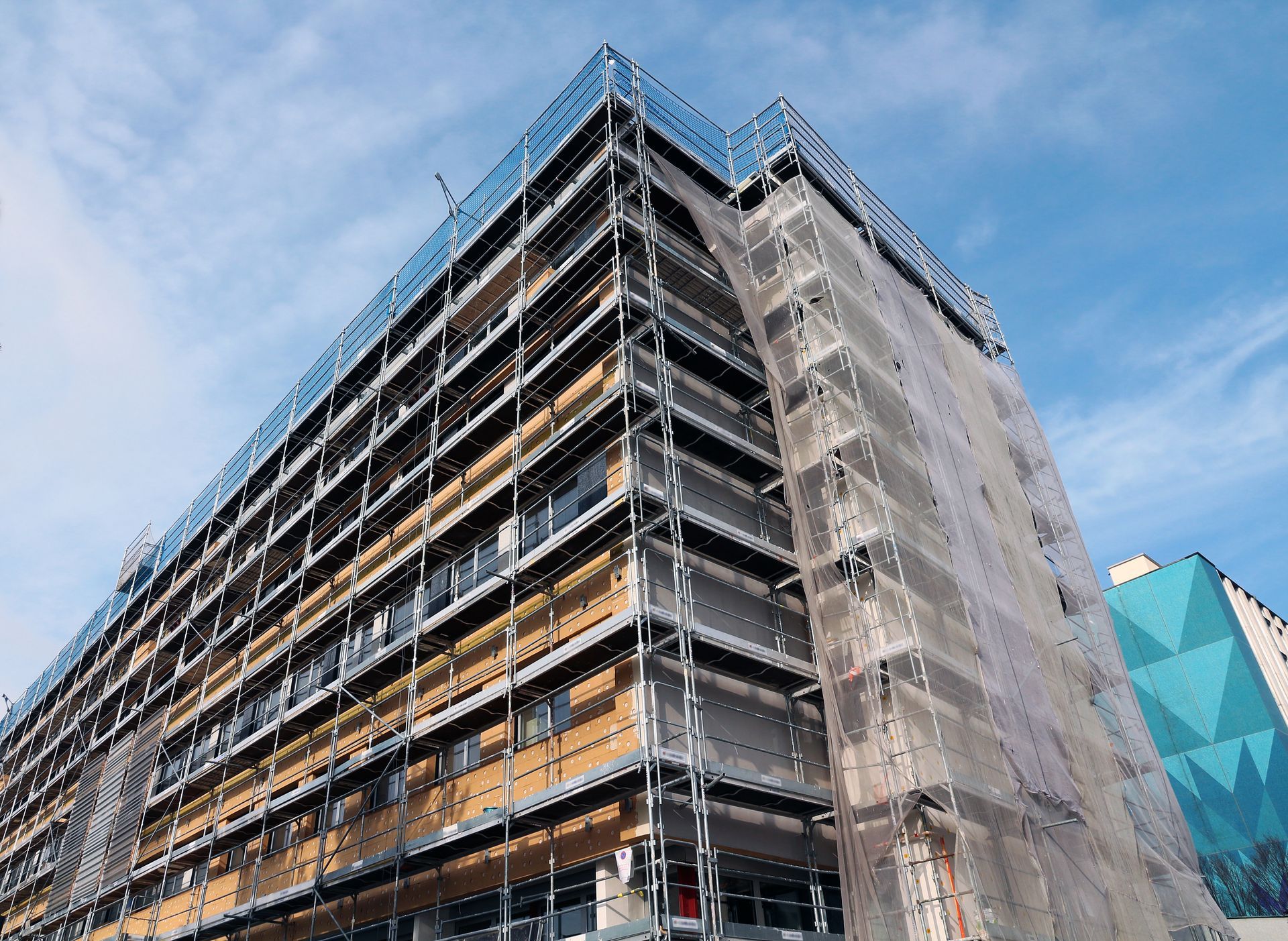News & Blog

by Damon Kennedy - overview of the Paper prepared by Brosnan Construction with input from Grimshaw & Co and MOD Finance)
•
24 July 2025
When building defects arise, Body Corporates face some of the most complex and high-stakes challenges in property management. From weathertightness failures to seismic upgrades, the remediation journey is often long, expensive, and technically demanding. But with the right approach — and the right team — these challenges can be managed effectively and transparently, while reducing risk and cost blowouts. This guidance draws on the combined expertise of Brosnan (construction and remediation specialists), Grimshaw & Co (legal advisors to Bodies Corporate), and MOD Finance (specialists in Body Corporate funding solutions) — developed to help committees and building owners navigate complex remedial projects with clarity and confidence. 1. Understand the Real Problem Before Procuring a Solution Every remediation project begins with symptoms — leaks, mould, cracking, or failure in fire protection systems. These are rarely the root cause. Skipping thorough investigation in favour of quick fixes often leads to repeated failures or cost escalations. Best practice tip: Invest in a comprehensive diagnostic phase before seeking contractor bids. Ensure the full scale of the issue is understood to avoid scope creep and future legal complications. 2. Build the Right Team Early Once defects are suspected or confirmed, the Body Corporate should assemble a multidisciplinary team. This typically includes: A project manager or quantity surveyor Remedial architect or designer A legal advisor (especially one experienced in Unit Titles Act obligations) Building surveyor and relevant specialists Why this matters: Bringing experts in early helps ensure the scope, design, and budget are aligned — saving time, avoiding duplicate work, and ensuring regulatory compliance. 3. Choose the Right Procurement Method for Your Project There is no one-size-fits-all approach to engaging a contractor. The choice between a traditional fixed-scope tender and an Early Contractor Involvement (ECI) process depends on the clarity of your project scope: For simple, well-defined projects (e.g. installing a new bike shed), traditional tendering works well. For complex or evolving scopes (e.g. remediation of systemic water ingress), ECI offers advantages by engaging the contractor early and collaboratively developing the scope. ECI benefits include: Cost certainty through earlier risk identification Reduced delays through better design integration Fewer disputes due to shared accountability As Brosnan notes, the ECI approach allows contractors to contribute to scope development from the outset, which helps ensure that final costs align more closely with initial estimates. 4. Budget Realistically and Plan for Flexibility One of the biggest pitfalls Body Corporates face is underbudgeting — often based on optimistic scenarios or incomplete scopes. Consider these financial planning principles: Budget for the likely full scope, including hidden defects often discovered during invasive works Allow for associated costs such as temporary accommodation, moving costs, and legal fees Implement fast decision-making mechanisms — like appointing an administrator under section 74 of the Unit Titles Act — to prevent project delays from extended committee deliberations 5. Don’t Delay Funding Decisions Once a project’s scope and design are better understood, secure your funding as early as possible. Delaying funding often leads to: Missed construction windows Escalating material and labour costs Legal risk if a Body Corporate is unable to act on known defect For many owners, raising lump-sum levies is not practical — especially when unit values are diminished by the very defects being addressed. Exploring ways to finance these projects upfront can help avoid delays and reduce stress on owners. 6. Consider Litigation Timing Carefully While litigation may be necessary, initiating legal action too early can be risky if the full scope and cost of remediation is not yet known. Many settlements fall short of actual project costs. A smarter strategy? Proceed with investigation and, where feasible, remediate first — then litigate with full cost clarity and preserved evidence. As Grimshaw & Co point out, it is always preferable to complete the investigation phase before being required to prepare evidence for trial. That allows claims to be quantified accurately and can improve outcomes significantly. 7. Treat Remediation as the Start of Better Asset Management Once works are complete, avoid a return to “set-and-forget” maintenance. Collect and preserve all operation manuals, warranties, and defect logs. Use this documentation to implement a preventative asset management programme to protect your investment — and reduce the likelihood of repeating the cycle. Final Thought Remediation projects are disruptive — but they also represent a once-in-a-generation opportunity to restore the value, safety, and liveability of your building. By following best practice procurement principles, assembling the right team early, and planning your approach carefully, Body Corporates can take control of the process rather than be controlled by it. This guide was developed with contributions from Brosnan, Grimshaw & Co, and MOD Finance.

3 July 2025
When it comes to managing apartment buildings or townhouse complexes in New Zealand, body corporate committees often face a difficult dilemma: undertake critical remediation or upgrade works now, or wait and hope the problem doesn’t get worse. Unfortunately, delay (or putting ones head in the sand) is rarely a cost-free option. From compounding deterioration and skyrocketing construction costs to declining property values and legal exposure, the longer a body corporate defers major capital works, the higher the financial and social toll becomes for all owners. The True Cost of Waiting Body corporates often hesitate to proceed with major works due to the large levies involved or the expectation that funding must be raised upfront from owners. But inaction carries real consequences: Escalating Construction Costs – Delays often lead to 10–20%+ increases in total project costs per annum. Compounding Damage – Small issues quickly worsen, resulting in more expensive repairs. Declining Property Values – Unresolved defects reduce resale value and buyer confidence. Insurance Risk and Legal Exposure – Insurers may raise premiums or drop coverage. Owner Discord and Decision Gridlock – Delay often breeds conflict among owners and affects community harmony. How Body Corporate Loans from MOD Finance Can Help MOD Finance offers a bespoke funding structure designed specifically for New Zealand Body Corporates undertaking significant capital works. Rather than relying on upfront special levies — which can be unaffordable for many — MOD’s solution spreads the cost of projects over time and aligns payment with progress. No Upfront Levies – Body corporates can avoid large, one-off levies on owners. Fast Access to Funds – Quick access to capital reduces costly delays. Flexible and Body Corporate-Centric – The loan sits with the body corporate, not individual owners. Project Stability – Ensures builders stay on board and projects proceed smoothly. No Personal Guarantees or Individual Credit Checks – we look at the Body Corporate (financials arrears etc) and the valuation of the building as key parts to our decisioning process. The ability just to get through to CCC in a remedial project is imperative for all unit owners. Once the remedial works have completed and have been signed off, owners can realise full value for their units if they have to sell. This is opposed to having to take drastic action such as selling before or during the remediation process, when the likely return is only a fraction of the units post-remediation value. A Smarter Path Forward In today’s regulatory, economic, and climate environment, doing nothing is the most expensive option . By putting off essential repairs or upgrades, body corporates risk higher future costs, reduced property values, and internal discord. MOD Finance enables committees to take decisive action — now — without placing undue stress on unit owners - even if it is just to get everyone through to CCC. It’s a smarter, more equitable way to safeguard the long-term value of your building and community. A MOD Finance Body Corporate loan structure helps you bring the benefit forward! Ready to Learn More? If your body corporate is grappling with how to fund major works, get in touch with MOD Finance. We’ll help you explore your options, understand the process, and move forward with confidence.

3 July 2025
As the number of multi-unit residential developments across New Zealand grows, so too does the need for urgent and sometimes large-scale remedial works - particularly weathertightness repairs, structural reinforcements, and seismic upgrades. For bodies corporate facing significant remediation challenges, funding these works in a timely and equitable manner is one of the most critical hurdles. At the heart of the solution is the body corporate loan , a financial instrument that provides a practical, scalable alternative to traditional special levies. Yet, one of the most overlooked enablers in this process is the ability to obtain a Section 74 High Court order under the Unit Titles Act 2010 (UTA) - a powerful legal tool that can pave the way for effective decision-making and remove dissenting roadblocks. Why Consider a Body Corporate Loan? Body corporate loans are specifically tailored to enable a building’s collective ownership group to fund necessary works without relying on every unit owner to contribute their full share upfront. The benefits include: Immediate access to funds , allowing remedial works to begin promptly and avoid further damage or cost escalation. Equitable treatment of owners , including the ability to structure repayments over time—important for owner-occupiers, retirees, or others who may be cash constrained. Preservation of property value , by addressing serious building defects that would otherwise depress resale prices or affect insurability. Administrative simplicity , as the body corporate takes on the loan and levies owners over time—typically aligned with quarterly contributions. Despite these benefits, many bodies corporate struggle to achieve the necessary resolution thresholds required under the UTA to approve such funding - especially in developments with absentee owners, differing financial capabilities, or disputes over the scope of works. The Role of Section 74: A High Court Solution to Owner Impasse Where a body corporate cannot achieve the required special resolution (typically a 75% majority) to approve a long-term loan or significant remediation scheme, Section 74 of the Unit Titles Act 2010 provides a vital legal remedy. Section 74 enables a body corporate - or an individual owner - to apply to the High Court for an order to perform or require remedial works that are necessary to protect the building or common property. Importantly, the Court can also authorise: The borrowing of funds to carry out these works. The allocation of costs among unit owners, even where not all owners agree. The appointment of an administrator to make or implement decisions on behalf of the body corporate. This is a critical safety valve for developments where disagreement or inertia could otherwise result in further building degradation, financial hardship, or exposure to legal liability. Case Law in Practice Courts have consistently recognised that failing to act on serious remediation matters—particularly those affecting health, safety, or habitability—is not an option. In several cases, the High Court has used Section 74 to override minority objections, where the majority of owners supported prudent and necessary action. When coupled with expert reports (e.g. from building consultants or quantity surveyors) and evidence of attempted engagement with owners, the Court has shown a willingness to intervene decisively to support collective building health and safety How Legal Counsel Can Assist Engaging legal experts early in the remediation journey can streamline the process and protect the body corporate’s legal standing. Key services include: Advising on whether a Section 74 application is appropriate or likely to succeed. Drafting High Court applications and supporting affidavits. Reviewing funding proposals and lender documentation. Ensuring compliance with the Unit Titles Act and associated body corporate rules. Conclusion: Act Now, Not Later Remediation is rarely convenient - but the longer it is deferred, the more costly and complex it becomes. Body corporate loans offer a sensible funding pathway for essential works, and the High Court’s Section 74 powers provide a means of resolution where internal consensus cannot be reached. By combining financial foresight with legal strategy, bodies corporate can secure the future of their buildings - and protect the wellbeing of their owners and occupants.

3 July 2025
Water ingress - often called weather-tightness or more colloquially 'leaky buildings' in New Zealand - is the silent intruder in our urban multi-unit housing stock. Left unaddressed, it undermines structural integrity, fosters mould, and eats away at property value. What starts as a small leak can escalate into a complex and costly remediation challenge. Spotting the Warning Signs Early Stay alert for these common signs of water ingress: Damp patches or discoloured cladding Peeling paint or musty odours Cracked exterior sealants or corroding joinery The Hidden Cost of Delay Delaying weather-tightness repairs can significantly increase the cost and risk profile for Body Corporates: Escalating Repair Bills – Costs typically rise 10–20% each year due to inflation and worsening damage Structural & Health Risks – Persistent moisture can compromise framing and support mould growth Insurance & Compliance Pressure – Insurers may increase premiums or withdraw coverage Owner Conflict – Frustration grows among unit owners when issues persist and decisions stall From Fix-it to Full-Fix: Temporary Patches vs Whole-Building Solutions Short-term patch repairs rarely address the root cause. Whole-building remediation is often more cost-effective over time, delivering long-term waterproofing protection and improved property value. How MOD Finance Helps MOD Finance provides tailored loan solutions for New Zealand Body Corporates facing remediation challenges: No One-off Special Levies – Spread costs across time, easing the financial burden on owners Quick Funds, Faster Fixes – Access capital quickly to reduce project delays Loan Stays with the Building – Debt remains with the body corporate, not individuals Project Stability – Secure funds up front and retain top-tier contractors A Practical Path for Committees Take these steps to get your remediation moving in the right direction: Commission a professional building survey Obtain quotes for full remediation—not just spot repairs Contact MOD Finance early for structured funding support Why Choose Timely Action Delaying repairs only compounds the problem. With MOD Finance, you can act now to resolve weather-tightness concerns, protect the building, and deliver peace of mind for owners—all while managing financial pressure through affordable, structured funding. Ready to Take Control? If your body corporate has signs of water ingress—such as leaks, mould, or decaying joinery—talk to MOD Finance. We’ll help you navigate the funding landscape and bring your remediation project to life, so your community can thrive safely and securely.

3 July 2025
The story of Marina View Apartments in Gisborne is a familiar one for many Body Corporates across New Zealand—what begins as a small maintenance issue can quickly evolve into a multi-year remediation ordeal, filled with financial strain, uncertainty, and owner frustration. Built in the mid-2000s, Marina View discovered significant weathertightness defects in 2015. As investigations deepened, further structural and fire safety issues were identified. A remediation project was planned and eventually commenced—but like many similar projects, escalating costs, delays, and levy shortfalls became a major threat to completion. The Hidden Cost of Owner Levy Fatigue The Committee had already taken the difficult step of raising special levies from owners. But as the project dragged on and construction costs grew, many unit holders had reached the limit of their borrowing capacity. Despite being close to the finish line, the project risked stalling just before the final code compliance sign-off. This is a scenario that plays out too often: owners committed to the process are suddenly hamstrung by others unable or unwilling to pay their share. In Marina View’s case, this created tension between owners, strained relationships with the builder, and increased costs due to delays. Without additional funding, the Body Corporate faced a real risk of missing the window for a Code Compliance Certificate (CCC)—a key requirement for preserving or realising full property value. How MOD Finance Helped Unlock a Path Forward The Committee at Marina View turned to MOD Finance, a specialist in Body Corporate funding, to secure the final stretch of capital needed. By arranging a facility that was backed by a Section 74 High Court order—giving the Body Corporate the legal ability to borrow—MOD Finance enabled the Committee to: Avoid further delays that could have led to legal disputes or cost blowouts; Complete construction works and maintain momentum towards CCC; Protect the property value of every unit, especially those still owned by the Body Corporate; Remove the immediate burden of large levies for unit owners already financially stretched. This funding was a strategic and stabilising step that brought clarity and certainty to a previously uncertain outcome. Why This Matters for Other Bodies Corporate Securing a Code Compliance Certificate isn’t just a bureaucratic box to tick—it can be the difference between full market value and a discounted, impaired asset. In Marina View’s case, the inability to complete the project would have jeopardised sales, refinancing, and even insurance. Body Corporate loans from MOD Finance aren’t just about plugging financial gaps—they’re about ensuring a project gets done right, protecting all owners' interests, and helping Bodies Corporate move forward confidently, even when the financial terrain is uneven. Key Takeaways for Committee Members and Owners Delays cost more than money —they create legal risk, builder disputes, and owner tension. Special levies can fail —even committed owners can reach financial limits. MOD Finance provides solutions —designed specifically for Bodies Corporate navigating complex repair, compliance, or remediation projects. Section 74 orders can empower your Committee —with the legal authority to act when consensus isn’t enough. At MOD Finance, we specialise in helping Bodies Corporate like Marina View complete critical works that protect long-term property value. If you're facing a complex funding challenge, talk to us about how we can help you finish what you've started.

3 July 2025
Weathertightness Crisis: A Slow-Burn Legacy The iconic “leaky homes” crisis - impacting timber‑framed apartments and townhouses built between the late 1980s and early 2000s - is still unfolding. Though much focus has been on standalone houses, multi-unit complexes are just as affected. The problem is enormous - estimates for remediation range from NZ$11 billion to NZ$53 billion. Local councils alone have already paid tens (if hundreds) of millions on claims and settlements. Weathertightness defects expose Body Corporates to litigation, escalating insurance, and remediation costs. A key court case (Imperial Gardens) saw repair cost claims over NZ$40 million. Yet many remain under-funded, putting repairs on hold and increasing risks. Damp buildings breed mould—compromising health, lowering property values, and complicating sales or financing. Seismic Compliance: A Pressing, Legal Deadline The Building (Earthquake-prone Building Deadlines and Other Matters) Amendment Bill extends remediation timelines by four years—but adds penalties up to NZ$150,000 per Body Corporate and NZ$50,000 per individual for non-compliance. Auckland alone has ~1,700 structures deemed earthquake-prone. Nationwide, around 500 deadlines are expiring in the next four years. Stronger structures require extensive retrofits, and for buildings up to 8 storeys, the seismic resilience element can still significantly bump overall construction costs. Besides fines, failure to comply can render buildings unsellable, uninsurable, and legally exposed. Side-by-Side Comparison

3 July 2025
Why Underfunding Often Breaks Projects For Body Corporates, when it comes to any construction project, from small long term maintenance requirements through to large capital remedial works for weathertightness or seismic issues, securing adequate funding is crucial. Without it, several challenges can arise, leading to significant delays and complications. Here are some key issues that often occur due to underfunding: Cashflow Gaps Widen: Construction contracts are staged around milestones - and if funds aren’t secured, scheduled payments can’t be made. This strains cashflow for builders, often causing them to pause work to avoid going under. Builders Get Paid Last: With limited funding, payments are often delayed. Contractors don’t tolerate cashflow uncertainty. As one construction adviser notes, “a builder’s biggest motivator is getting paid” - and if they know funds are guaranteed, they’re more likely to negotiate on materials and scheduling to save costs. The Hidden Costs of Builder Walk-Offs Legal Disputes: Contractual claims; mediation or tribunal fees. Remobilisation Delays: Crew re-scheduling, repricing materials, and starting site setups. Inflation Adjustment: NZ construction inflation can raise costs significantly after delays. Contractor Premiums: Replacement contractors often charge mark-ups for short-term or urgent projects. Relationship Breakdowns: New hires take longer to integrate, and knowledge transfer is lost. Even short delays can result in a 5–10% total cost increase—caused by these compounded factors. Real-World Example Legal firm, Grimshaw & Co., in their resource guide (published by Grimshaw & Co on their website), warns that stalled body corporate remediation work can “result in incomplete repairs and years of delay and frustration.” Litigation is common, especially after builder walk-offs - a legal process that draws out costs and erodes trust. Aligning With Builders: Why Funding Certainty Matters Streamlined Negotiations: When a builder knows they’ll get paid reliably, they’re far more likely to offer competitive bids and absorb small cost variances - limiting overruns and saving you money. Efficient Project Flow: A fully-funded project supports better scheduling, subcontractor retention, and fewer stop-starts, reducing risk and boosting completion certainty. Cost Transparency: Builders are more willing to share insights, offer value-engineering suggestions, and propose savings when financial risks are minimized. How MOD Finance Helps Keep Projects on Track Upfront Loan Funding: MOD Finance offers Body Corporate loans sized to the full scope of works—ensuring builder contracts can be fully secured from the outset. Payment Confidence for Builders: With funding in place, builders gain assurance—and often pass on savings via maintenance, bulk ordering, or timing efficiencies. Reduced Legal and Inflation Risk: No cashflow holes = fewer contract breaches, reduced legal disputes, and protection against rising costs due to delay. Relationship & Reputation Preservation: Successful, on-time projects build trust—not just with builders, but also among unit owners, ensuring future maintenance runs smoothly. Final Take Avoiding builder walk-offs isn’t just about project completion - it’s about protecting value, minimizing legal exposure, maintaining community cohesion and stress reduction for owners. Every delay deepens cost and frustration. Normally these happen near the end of a project when project fatigue is in full effect for not only the builder, but moreso for the unit owners in the Body Corporate. With MOD Finance’s tailored Body Corporate loans, your remediation or upgrade projects gain certainty, momentum, and cost control. If your Body Corporate is about to launch - or has stalled - reach out. We'll help you get back on track and finish well.

3 July 2025
The Continuing Legacy of Leaky Buildings Earlier estimates placed the cost of the leaky homes crisis at around NZ$11 billion; more recent projections have ballooned to as much as NZ$47 billion. There are numerous examples of multi-unit developments that are equally affected — The Connaught in Auckland is undergoing a $46 million reclad, with 98% of owners already levied in advance to fund progress. A decade-long $157 million lawsuit involving Harbour Oaks found Auckland Council breached its duty of care during building inspections. Levy Fatigue and Its Consequences Remediation for larger complexes often leads to special levies in the tens of thousands per unit—stressing household budgets unexpectedly. Diverging levels of owner readiness to pay big sums upfront mean meetings fail to reach quorum, postal ballots stall, or personal disputes escalate, delaying critical work. Delay's then cause inflationary cost increases and the subsequent building degradation increases the costs at exponential levels. Unpaid levies accrue interest and legal fees; defaulting owners can lose voting rights or face liens against their units, while others shoulder more burden. The emotional and financial strain can be substantial—some owners spend years repaying, sell at distressed prices (sometimes as low as 10% of the remediated market value), or face indebtedness. Negative Outcomes: Macro to Micro Body Corporate: - Projects stall mid-way, increasing costs - Administration expenses balloon - Insurance becomes harder or more expensive - Reputation suffers, discouraging buyers Individual Owners: - Unexpected $20-100k+ bills destabilise household budgets - Legal debt, interest charges, damaged credit ratings - Loss of voting rights, tribunal disputes - Resale complications and negative equity impact This takes an unimaginable toll on the Body Corporate community with the stresses creating a less than optimal environment for their day to day living. What Experts Say Climasure (July 2025) reports the crisis might cost around NZ$47 billion, describing it as a “slow‑motion disaster” comparable to earthquake casualty levels. Hobans (Dec 2022) emphasises that remediation timelines can stretch for years—with disputes often delaying progress long after funding is raised. Dentons (2022) warns of cost overruns in the tens of millions, and highlights that some Body Corporates even seek court approval to cancel unit plans when repairs become uneconomic. How MOD Finance Provides a Better Path Avoid big upfront financial shocks: Instead of asking individual owners to pay tens of thousands per unit immediately, MOD Finance offers a collective loan that spreads payments over time—easing cashflow pressure. Enable proactive project delivery: With funding secured, committees can sign contracts, hire professionals, and meet regulatory deadlines—no more waiting for quorum or full levy collection. Reduce disputes, protect relationships: Predictable repayments reduce tension between owners, making discussions less adversarial and allowing focus on common purposes, not cash divides. Defend property value and insurability: Timely remediation and funding certainty make buildings more attractive to insurers and buyers—while avoiding credit adverse events for individual owners. Final Take Leaky building remediation is costly—but delaying or splintered funding makes it exponentially worse. Special levy fatigue isn’t just a governance headache, it impacts lives, finance, and long-term asset value. MOD Finance’s Body Corporate loan solution is a smarter funding pathway: collective, structured, stress-reducing, and value-preserving. If your Body Corporate is facing remediation costs, uncertain funding timelines, or owner conflict, get in touch—we’ll work with you to create a plan that works for everyone.

